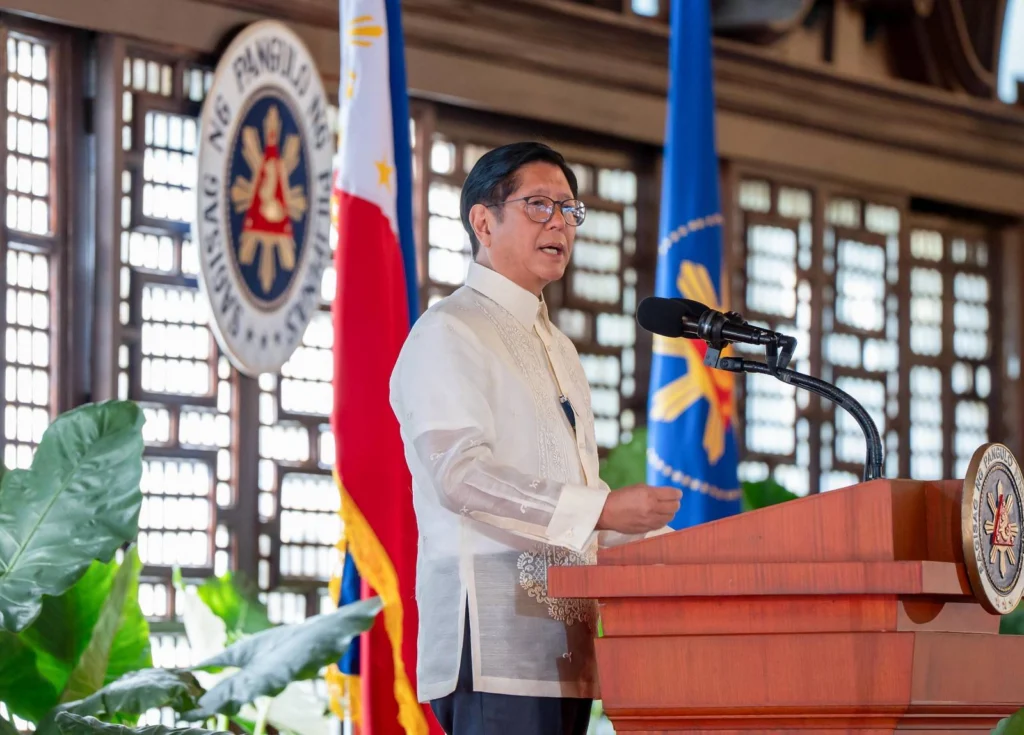|
Getting your Trinity Audio player ready...
|
Philippine President Ferdinand Marcos Jr. has signed Republic Act (RA) No. 12254, also known as the E-Governance Act, institutionalizing the transition to digital governance across all branches and levels of government.
- Pushing for digital governance
- ICT fuels good governance
- DICT guides e-governance shift
- New office to lead e-governance
- Charting the digital future
- Privacy checks
- E-Governance Act spurs partnerships
- Free Internet, smarter governance
Marcos inked the measure on September 5. The law mandates a “regulated, secure, and robust information and communication system” to foster citizen-centered online services and integrated government operations. RA 12254 applies to executive, legislative, judicial, and constitutional offices, including local government units (LGUs), state universities and colleges (SUCs), government-owned or -controlled corporations (GOCCs), and instrumentalities both within the Philippines and abroad.
The act also encompasses back-end government operations. “Nothing in this Act shall be construed to derogate from the fiscal and administrative autonomy and independence of government entities,” the law stated.
Marcos: Digital governance is a state priority
Marcos emphasized the role of ICT in nation-building. He underscored that the law ensures a shift toward responsive and transparent governance.

“The government shall implement a regulated, secure, and robust information and communication system to facilitate a responsive and transparent online citizen-centered services,” Marcos said.
He noted that the E-Governance Act was among the bills he highlighted in his first State of the Nation Address (SONA), stressing the need to bring services closer to citizens through technology.
DICT as lead implementing body
The Department of Information and Communications Technology (DICT) is designated as the law’s lead implementing body. Under RA 12254, the DICT is tasked to ensure that “all ICT projects in the Philippines will be done in accordance with the National ICT Development Agenda and E-Government Master Plan, as provided under RA 10844 or the Department of Information and Communications Technology Act of 2015.”
The DICT must harmonize national and local ICT projects with government-wide ICT plans and applicable standards. The agency is further instructed to “adopt a national policy and process that promotes innovations, supports start-ups, and facilitates the entry and adoption of technologies.”
According to the law, the DICT will “support, advise, monitor, and guide government agencies in ensuring the quality, security, and reliability of their respective ICT infrastructure and services.”
The DICT welcomed the signing of RA 12254, describing it as a milestone in the country’s digital transformation.
“The E-Governance Act institutionalizes a unified, interoperable, and secure digital government system that will streamline processes, reduce red tape, and enhance transparency,” the department said in its statement.
DICT Secretary Henry Aguda expressed gratitude to Marcos, saying, “We thank the President for turning this long-standing aspiration into reality. The E-Governance Act is more than just reform, but a promise fulfilled under his leadership. With this law, government services will now be within reach of every Filipino: efficient, transparent, and secure.”
“The DICT is fully committed to bringing this vision to life, working hand-in-hand with all agencies and local governments to ensure that no one is left behind in the digital age,” Aguda added.
Unified E-Gov Project Management Office
Within one year of the law’s effectivity, the DICT must establish a government-wide E-Gov Unified Project Management Office (EGov UPMO). The office will oversee portfolio, program, and project management across agencies. It will be headed by the DICT Undersecretary for E-Government.
The law provides that the EGov UPMO is “tasked to ensure effective handling of ICT projects in line with international best practices and standards.”Blueprint for digital transformation
RA 12254 directs the DICT to formulate and regularly update an E-Government Master Plan (EGMP), which will “serve as a blueprint for the development and enhancement of all electronic government service processes and workforce to achieve digital transformation in the bureaucracy, taking into consideration the Philippine Development Plan.”
The EGMP will cover both citizen-facing and internal government systems.
The law enumerates E-Government Programs (EGPs), includin Citizen Frontline Delivery Services Platform; Electronic Local Government Unit (eLGU) System; Government Digital Payment Systems; Government Public Key Infrastructure Program; Online Public Service Portal; and, Philippine Digital Health System.
Local governments are specifically mandated to “establish their own portal or utilize the eLGU system developed by the DICT.”
Safeguards on privacy and security
RA 12254 mandates the DICT to conduct a Privacy Impact Assessment on proposed systems for processing personal data, in accordance with National Privacy Commission guidelines.
The law requires the DICT to “prescribe and implement minimum information security standard for E-Government, aligned with internationally accepted standards, relevant laws, rules, and regulations, including its own policies, to ensure the security of all ICT systems.”
It further instructs the DICT, in coordination with other agencies, to “issue guidelines for the protection of the government’s critical information infrastructure identified in the EGMP.”
The law stresses: “All resources, information, or data stored in or transmitted through the government information systems and all networks interconnected to and interoperable with it, the portals, and websites shall be kept secure and free from interference or unauthorized access that can hamper or otherwise compromise the confidentiality, integrity, and availability of the ICT assets.”
Partnerships with private sector
The law allows national and local governments to enter into contracts and partnerships with the private sector for the provision of ICT resources and services, subject to public accountability and transparency laws.
The law provides that “public telecommunications entities (PTEs) and non-PTE internet service providers (ISPs) shall be allowed to enter into contracts with government agencies at the national and local levels to build and operate networks to provide internet connections in support of E-Government Programs, especially in the underserved and unserved areas.”
Strengthening ICT literacy and access
The DICT is instructed to reorganize its ICT Literacy and Competency Development Bureau and to develop rules for operating the ICT Academy for E-Governance. The free public Internet access program will also utilize the Free Public Internet Access Fund to provide networks, databases, and core systems to facilitate digital learning and citizen engagement.
RA 12254 was made public on Sept. 18 and will take effect 15 days after its publication in the Official Gazette or in a newspaper of general circulation.
Watch: eGov super app opens the best opportunities for Philippines

 02-18-2026
02-18-2026 




